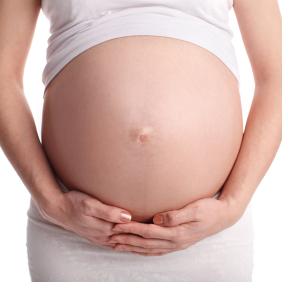LHRH Analog May Help Preserve Fertility in Breast Cancer Patients
Treatment with combined chemotherapy and the LHRH analog triptorelin may help preserve fertility in premenopausal women with breast cancer.
Triptorelin could help preserve fertility in women with breast cancer.

Treatment with combined chemotherapy and the luteinizing hormone-releasing hormone (LHRH) analog triptorelin may help to preserve fertility in premenopausal women with breast cancer. Women who received the combined treatment had trends toward improved rates of menses resumption and becoming pregnant compared with the women treated with chemotherapy alone.
Long-term results of the PROMISE GIM6 study (Abstract 105) were presented at the 2014 American Society of Clinical Oncology (ASCO) Breast Cancer Symposium by Matteo Lambertini, an oncology fellow at IRCCS AOU San Martino-IST in Genova, Italy.
Although the differences in number of pregnancies and resumption of menses were not significantly different between women treated with chemotherapy alone and those treated with chemotherapy plus an LHRH analog, the trends indicate that the LHRH analog should be considered as an option to preserve ovarian function and fertility in this patient population, Lambertini said.
The results of this trial also echo those of the POEMS trial (Abstract LBA505) presented at the 2014 ASCO Annual Meeting, which showed that concurrent administration of chemotherapy with an LHRH analog resulted in less premature ovarian failure and more pregnancies.
To date, there have been eight randomized trials and eight systematic reviews that have shown conflicting results of the efficacy of LHRH analogs as a strategy to preserve ovarian function during cytotoxic treatments in patients with breast cancer. There are little data on long-term outcomes, prognosis, survival, and long-term ovarian function in these patients, and questions remain about the safety of administering LHRH analogs and chemotherapy concurrently.
“For all of these reasons the 2013 ASCO and ESMO [European Society for Medical Oncology] guidelines on fertility preservation in cancer patients still consider the use of LHRH analogs as an experimental strategy to preserve fertility,” Lambertini said.
The PROMISE GIM6 study was a multicenter, randomized, phase III study in premenopausal women with stage I to III breast cancer who were candidates for neoadjuvant or adjuvant chemotherapy. Patients were randomly assigned to chemotherapy with (n = 148) or without (n = 133) the LHRH analog triptorelin. The primary outcome was incidence of chemotherapy-induced early menopause. In addition, patients underwent long-term follow-up to look at pregnancies, long-term recovery of ovarian function, and events.
Results of the primary analysis were published in JAMA in 2011 and showed that concurrent administration of chemotherapy and an LHRH analog showed a 70% absolute reduction in the ovarian failure rate at 1 year. Patients on combined treatment also had a highly significant reduction in treatment-related early menopause.
The present analysis took place after a median of 7.3 years of follow-up. At that time, three pregnancies occurred in the chemotherapy arm and eight in the combined arm. The 5-year cumulative incidence of pregnancies was 1.6% in the chemotherapy arm compared with 2.9% in the experimental arm (P = .142).
The 5-year cumulative incidence of menstrual resumption was 64% in the chemotherapy arm compared with 72.6% in the chemotherapy plus LHRH analog arm (P = .071).
The researchers found no differences in 5-year disease-free survival between the two treatment arms.
Gedatolisib Combo With/Without Palbociclib May Be New SOC in PIK3CA Wild-Type Breast Cancer
December 21st 2025“VIKTORIA-1 is the first study to demonstrate a statistically significant and clinically meaningful improvement in PFS with PAM inhibition in patients with PIK3CA wild-type disease, all of whom received prior CDK4/6 inhibition,” said Barbara Pistilli, MD.